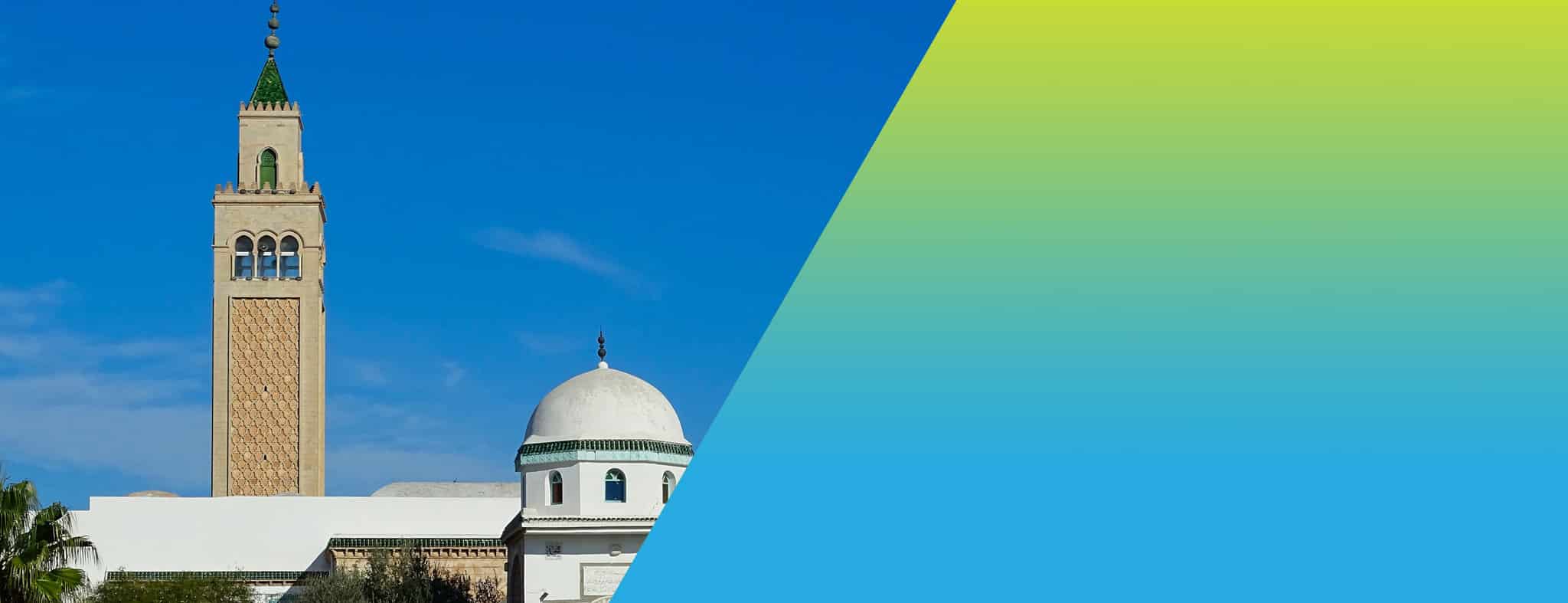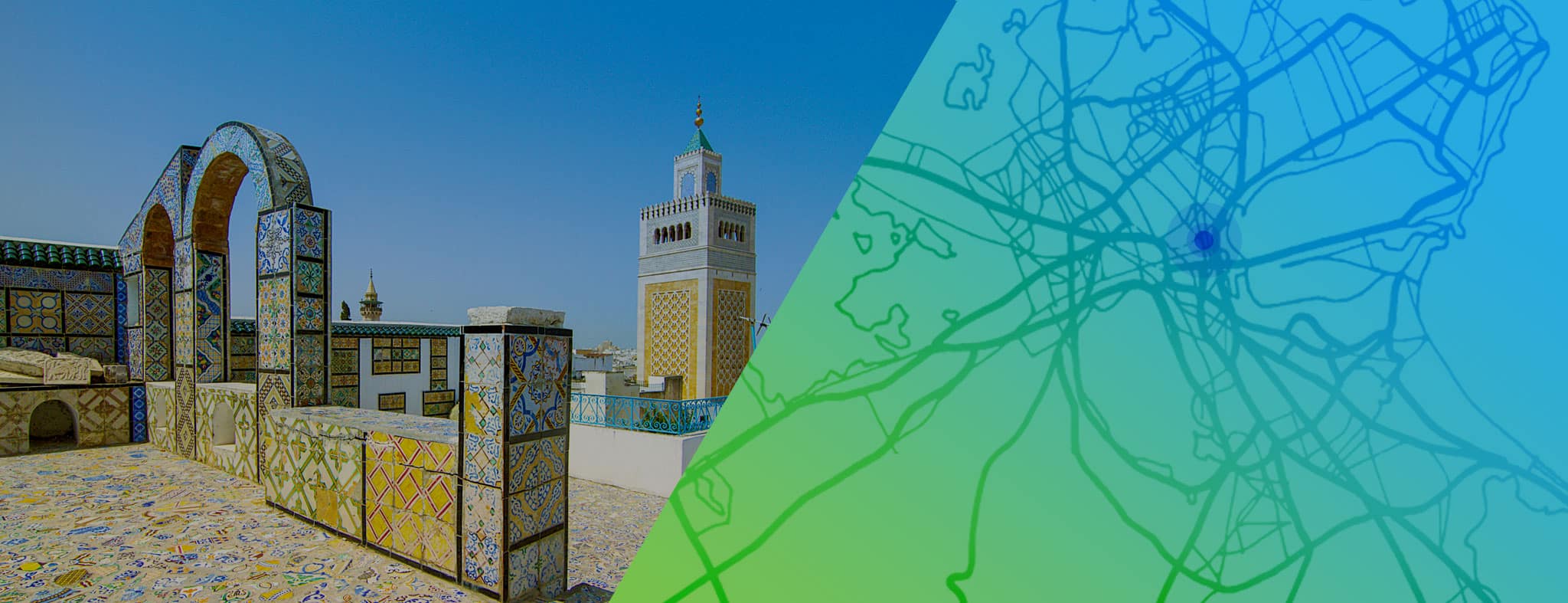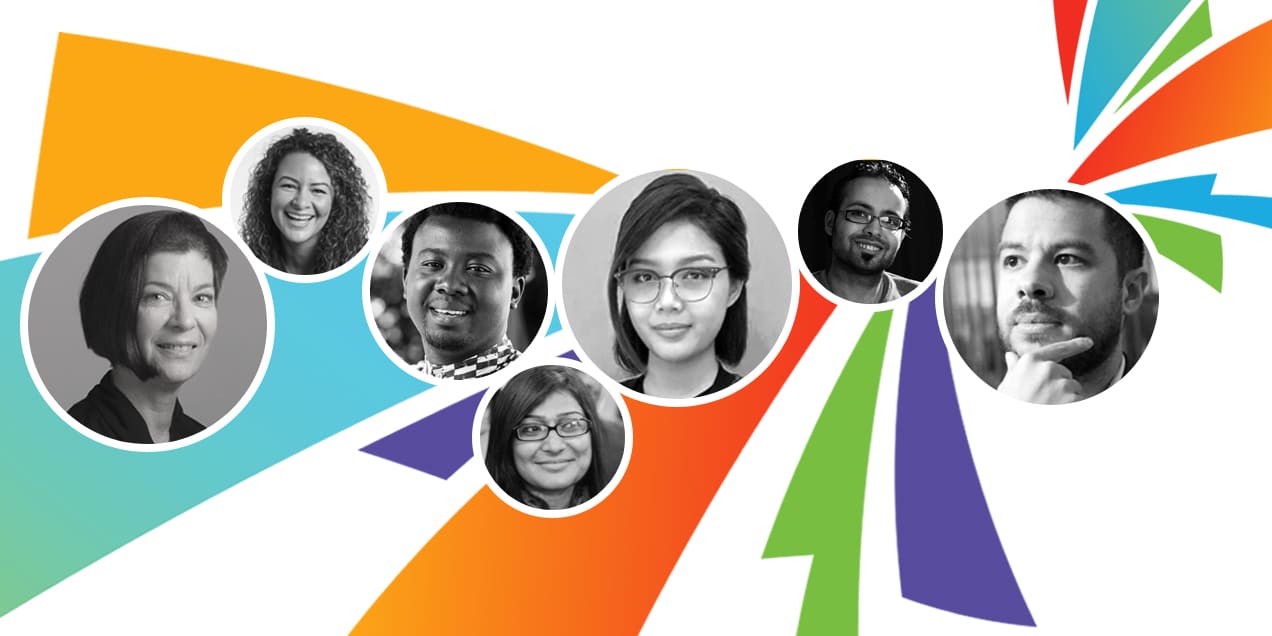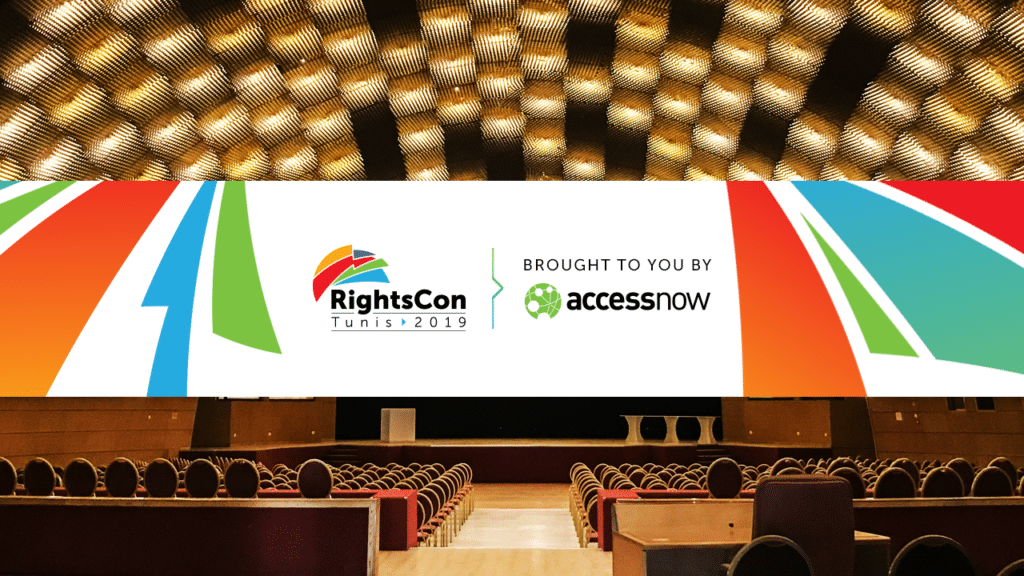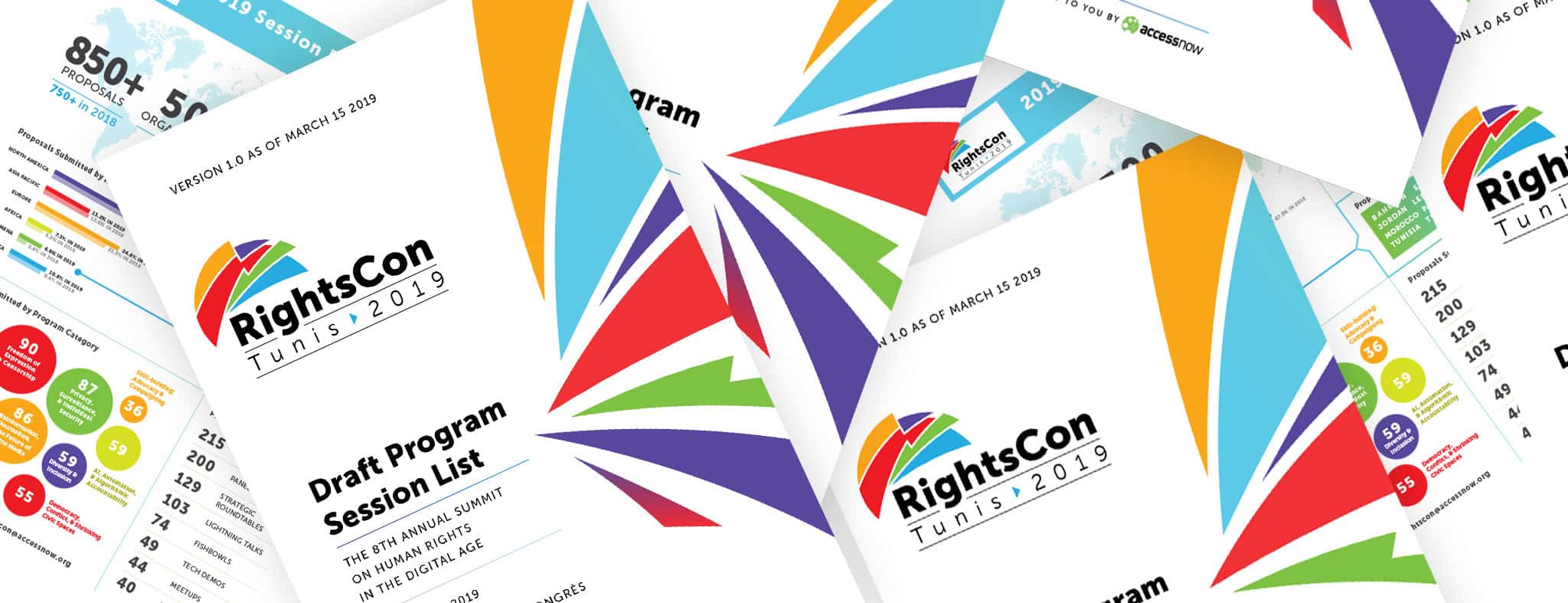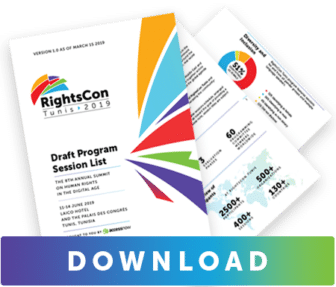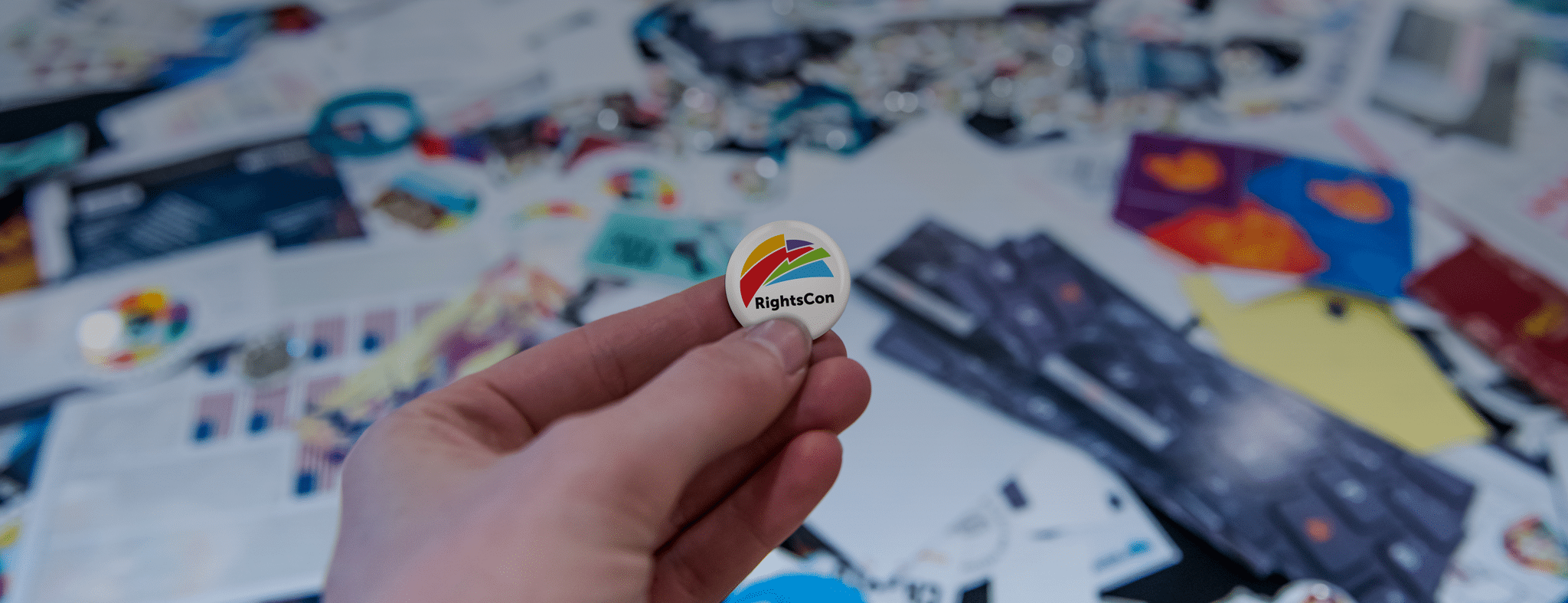
The planning is done. The event is set. The speakers are ready. The wait is over… RightsCon Tunis is here!
We are once again bringing together a global community of the world's leading experts to tackle all the most important issues at the intersection of human rights and technology. Sometimes bigger really is better and this year is no exception, being our largest RightsCon summit yet! We have managed to pack 17 thematic tracks and 450+ sessions into three intensive days. From the regulation of facial recognition, to disinformation in democratic societies, we’ve got it covered.
However, we are also conscious that many members of the global digital rights movement won’t be able to physically join us Tunisia. We want you to know that even if you can’t be in the room, your voice is just as important in helping us build a better future for everyone in digital age. The conversations happening online reverberate in the halls of RightsCon each year, and will ultimately be the most important catalyst for continuing the work long after the closing ceremony.
With this in mind, here’s how you can stay connected with the RightsCon community from anywhere in the world:
Twitter
Those participating in the event, including key speakers, will be live-tweeting their insights, reactions, and questions on all the most pressing topics around human rights in the digital age. We encourage you to join in the conversation on Twitter with the official #RightsCon hashtag. To keep up with
readmore

This is the third in a series of RightsCon blog posts on safety and security ahead of our 8th annual summit in Tunis. Read our first and second post here.
In a few days, we’ll come together for the largest RightsCon in our summit’s history – the first hosted in Africa and the Middle East. As we put together the final touches to welcome participants, we wanted to share our final blog post in a series highlighting our ongoing efforts to build a safe, secure, and productive space for the RightsCon community.
This post will introduce key team members who have been working hard behind the scenes to ensure all measures, mitigations, plans, and processes are in place to support the 2500+ participants joining us in Tunis next week. As RightsCon grows, so too do the spaces our community occupies. For this reason, we want to provide insight and information on what may look a little different this year, as well as how to best navigate and experience the RightsCon venue.
As a reminder, you can read about how we’ve been thinking about safety and security and review tips for staying safe – both online and off – in the lead up to and at the summit. We are looking forward to a successful and exciting RightsCon, but we also recognize there may be instances where participants want to r

RightsCon isn’t a moment – it’s a movement.
Last week, we launched our official program schedule for RightsCon Tunis (June 11 to 14, 2019). In less than a month, 2500+ civil society leaders, industry experts, policymakers, and human rights advocates will come together in the capital of Tunisia – an emerging tech hub and growing democracy – to set the global agenda for upholding human rights in the digital age.
Since 2011, RightsCon has been a critical convening space. This year’s program is poised to be our best yet, with 17 thematic tracks and 450+ unique sessions packed into three intensive days. Whether through interactive workshops, intimate strategic roundtables, compelling fireside chats, or meetups, participants will play an active role in building a better future.
In 2019, we’re also introducing two new session types: Solve My Problem, guided dialogues for developing strategies to resolve a specific emerging issue, and Landmarks, high-profile plenaries covering some of the more pressing topics, which will take place in our premiere session space.
Our program spans a wide range of topics. Below you’ll find an overview of this year’s thematic tracks. Mix and match sessions to fit your interests, or follow one track al
Tip 1: Plan ahead | Tip 2: Strengthen your digital security | Tip 3: Get to know Tunisia | Tip 4: Review our safety plan (and yours) for RightsCon Tunis | Tip 5: Enjoy RightsCon!
We’re less than a month out from RightsCon Tunis, our first-ever global summit hosted in the Middle East and North Africa region. The RightsCon Team has been hard at work, building the program and coordinating the community experience from the Access Now Tunis office, and we can’t wait to welcome you.
Last month, we published our blog post, How we’re thinking about community safety and security, to share our reflections and approach to convening a space that is safe and productive for all participants.
In our post, we outlined how important it is to us that everyone who attends RightsCon is equipped with the information and resources they need to have a positive experience. To that end, and with June fast approaching, we’re getting in touch to provide you with tips for getting ready for and staying safe – both online and offline – throughout RightsCon Tunis.
As always, we want to hear from you. If you have any questions or concerns, please email us at [email protected] or [email protected]

The Community Voices series highlights the work of our community — civil society organizations, governments, companies, human rights defenders, and startups — in the lead up to, during, and after RightsCon.
Mawjoudin is a Tunisian organization that provides LGBTQ individuals, allies and other marginalized groups with a safe space to express different identities, to share, discuss, and learn in “diversity-friendly” contexts. Ali Boussemli, the co-founder of Mawjoudin, describes how Mawjoudin transformed from a Facebook page for individuals to share posts and photos related to SOGIESC (Sexual Orientation, Gender Identity & Expression and Sex Characteristics) rights into an organization that aims to raise awareness about SOGIESC related issues, including sexual and bodily rights.
In Arabic, Mawjoudin means “we exist” and the organization’s mission is dedicated to achieving that recognition in Tunisia. Through awareness raising, they seek to improve the well-being of the country's LGBTQ community. The organization hosts a series of workshops and trainings around the country on capacity building, advocacy, human rights, and digital security with an emphasis on gender sensitivity. They also provides support through medical and psychological services, legal and digital aid, including a number the LGBTQ community can call.
In recent years, they have been leaders both online and offline for campaigns advocating for LGBTQ and marginalized individuals. These campaigns have led to the development of workshops educating participants about asylum and LGBTQ rights. These workshops highlight important support systems ava

This blog post is the first in a series highlighting ongoing efforts to support community safety and security, wellness, and resiliency at RightsCon Tunis.
At the very first RightsCon event, the Silicon Valley Human Rights Conference in 2011, we opened with keynotes from Egyptian activist Alaa Abd El-Fatah and Thai journalist Chiranuch Premchaiporn. Chiranuch faced criminal charges for the comments posted on her independent news site because what was said was deemed offensive to the monarchy. Alaa was charged under harsh anti-protest laws and has only recently been released from prison after five years behind bars for participating in peaceful demonstrations.
From the early days of RightsCon, we have worked to create a platform and a gathering space for courageous people like Alaa and Chiranuch, who are fighting for human rights under the most challenging circumstances. Coming together is in itself an important act of solidarity, and the RightsCon program is designed to generate clear next steps for those of us working to push back against the shrinking spaces for freedom of expression and democratic participation across the globe.
As we prepare for June, we’ve been taking the time to reflect on how we can address the evolving safety concerns that many, including Access Now staff, are experiencing in the current political climate. We’re publishing this blog post to provide insight into the behind-the-scenes work being done for RightsCon Tunis, share our current practices and approaches, and open t

It’s time – the draft program with the Session List for RightsCon Tunis has arrived!
The Draft Program Session List is the first glimpse of RightsCon Tunis and the outcome of our annual call for proposals, showcasing the community-built sessions that will shape this year’s program.
The competition was steep, with over 900 high-quality session submissions received in our annual call for proposals. In three evaluation phases, that brought together over 60 experts from around the world, this list composes the sessions that have been accepted in full or merged with another like-minded proposal.
 The Draft Program Session List is a first glimpse into what you can expect this year. It’s made up of workshops, strategic roundtables, fireside chats, meetups, and more, all led by organizations, companies, human rights advocates, and governments from more than 70 countries and 400 organizations. The program also features sessions in three languages – Arabic, French, and English – and is sourced from a majority female community of organizers.
Please keep in mind, this is just a sneak peek into the breadth and depth of the issues c
The Draft Program Session List is a first glimpse into what you can expect this year. It’s made up of workshops, strategic roundtables, fireside chats, meetups, and more, all led by organizations, companies, human rights advocates, and governments from more than 70 countries and 400 organizations. The program also features sessions in three languages – Arabic, French, and English – and is sourced from a majority female community of organizers.
Please keep in mind, this is just a sneak peek into the breadth and depth of the issues c

The Community Voices series highlights the work of our community — civil society organizations, governments, companies, human rights defenders, and startups — in the lead up to, during, and after RightsCon.
7amleh – The Arab Centre for the Advancement of Social Media – is a non-profit organization dedicated to the promotion of the digital rights of Palestinians and Arabs. Since its founding in 2013, 7amleh has spearheaded efforts to leverage digital advocacy tools for expanding awareness, knowledge, and access to digital rights amongst Palestinian and Arab civil society. The organization relies on three pillars in pursuit of this goal: capacity building, outreach and advocacy, and campaigns.
Based in Haifa, the organization’s reach is extensive – in 2018 alone it trained over 1,500 youth in digital security across a number of cities. According to Nadim Nashif, Executive Director, the goal of this professional capacity building and training is to “strengthen local civil society, activists and the public in defending, protecting and advocating for their digital rights, and to further digital activism.”
7amleh takes a comprehensive approach to developing its training programs. In 2018 the organization conducted a survey across more than 100 organizations working throughout the region that identified the challenges and needs for training and capacity building. The results highlighted issues such as the dearth of funding and specialized experts to problems with accessing a targeted group or running social media pages. This unders

Anglais
La série “voix de la communauté” célèbre le travaille de notre communauté RightsCon qui se constitue d’organisations de la société civile, des gouvernements, des entreprises, des défenseurs des droits humains et des startups en préparation avant, pendant et après la conférence.
MRA Mobilising for Rights Associates est une organisation internationale à but non lucratif qui travaille pour la promotion des droits des femmes en Afrique du nord depuis 2000. Basée à Rabat au Maroc, l’organisation collabore avec des activistes et associations locaux qui défendent les droits des femmes au Maroc, en Tunisie, en Algérie et en Libye pour que les femmes puissent en jouir pleinement de leurs droits humains et juridiques.
D'après Stephanie Willman Bordat, co-fondatrice de l’organisation, l’ONG adopte une approche globale dans le but de contribuer aux changements des lois, des structures et des relations qui régissent les femmes au Maghreb, en particulier celles liées aux violences faites aux femmes. L’organisation s’appuie sur un réseau diversifié de partenaires qui inclut non seulement des femmes situées dans des zones défavorisées et mal desservies telles que les bidonvilles, les villages ruraux et les quartiers urbains populaires mais aussi des coalitions opérant au niveau international, ce qui leur confère un impact au niveau local et au niveau global. Pour cela, l’association emploie de nombreuses stratégies, dont l’éducation populaire aux droits humains, l’accompagnement juridique, le monitoring et documentation, la recherche-action, les litiges stratégiques des réformes législatives nationales, et le plaidoyer in



